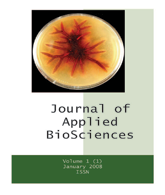Journal of Applied Biosciences (J. Appl. Biosci.) [ISSN 1997 - 5902]
Volume 42: 2867 - 2875. Published June 14, 2011.
Weed control and yield improvement of Solanum tuberosum (L.) in Adamawa region (Cameroon) by soil solarization and chicken manure.
1Megueni C. *, Ngakou A., Mabong M.R., Abdoulaye.
1University of Ngaoundere ; Faculty of Science; Department of Biological Sciences; P.O. Box: 454 Ngaoundere, Cameroon
* Corresponding author e-mail: [email protected]ABSTRACT
Objective: In Adamawa region (Cameroon), the reduction of crop productivity due to inappropriate weed management can be estimated to 90%. The use of herbicides is a principal main method of weed control but is expensive for resource poor farmers and detrimental to the environment. A sustainable solution for weed control is an urgent challenge.
Methodology and results: A randomised complete block design with 3 replications was used. Treatments were a one month soil solarization alone (SS), chicken manure (8.75 t.ha-1) alone (CM), soil solarization + chicken manure (SCM), and untreated control (C). Solarization and chicken manure increased soil temperature and reduced the emergence and growth of weeds. Solarization technique reacts like herbicide on recalcitrant weeds like Imperata Cylindrica, the most troublesome weed of vegetable crops in sub-Saharan Africa. Chicken manure enhances the weed control effect of solarization technique. Immediate effect of this weed control is potatoes yield improvement. SCM treatment increases potatoes yield by 91 %.
Conclusions and application of findings:
Making use of the weed control by the soil solarization technique, farmer can save money and time of weeding. High temperature reached under the plastic mulch removes Seed-coats dormancy of some leguminous genus that emerges as weeds. These atmospheric nitrogen fixing species reinforce the positive effect of solarization technique by having positive impact on soil fertility. Chicken manure has also an apparent antagonist effect on weeds density. Potatoes yield was significantly increased by solarization and by chicken manure; therefore, soil solarization combined with organic mater such as chicken manure could be a sustainable alternative strategy to the use of herbicides for weed control and for potatoes yield improvement in the context of Adamawa region (Cameroon). This sustainable practice is cheaper for limited-resource farmers, is harmless to human and is environment-friendly. It may be mostly useful in agroecosystems that do not use herbicide, such as in biological agriculture practised by organic growers.
FULL PAPER [PDF AVAILABLE HERE]
